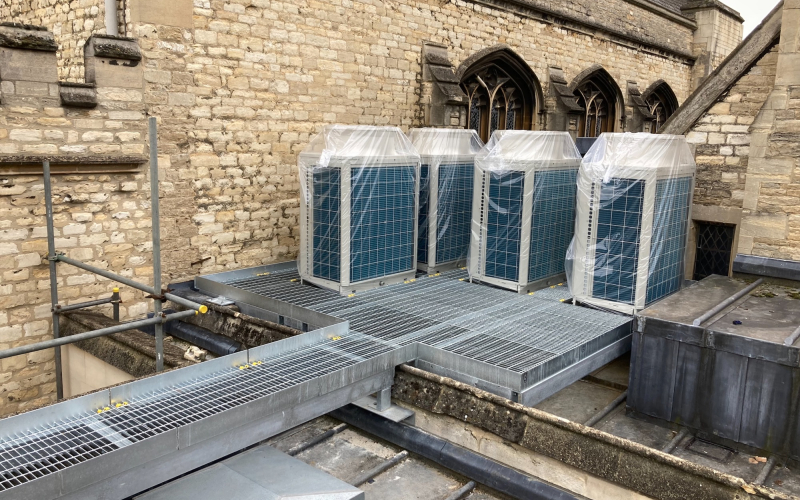Heat Decarbonisation
As a College, we aspire to achieving Net Zero operational carbon by 2030 and are collecting data to allow us to set an ambitious but achievable Net Zero indirect carbon target.
Pembroke has been following a site-wide decarbonisation plan which was developed with sustainability and engineering consultant, Max Fordham, following a government grant from Low Carbon Skills Fund.
Since works began in 2023, we have decarbonised 45% of the College's estate by removing gas boilers and installing Air Source Heat Pumps (ASHPs) in key areas of College such as the Dining Hall, Rokos Quad and part of the Geoffrey Arthur Building (GAB) Annexe.
Recent decarbonisation projects:
Rokos Quad:
- Using funding from the PSDS, work began in Rokos Quad in December 2024 on a project to replace all Ground Source Heat Pumps and gas boilers with Air Source Heat Pumps; and the solar-thermal with photovoltaic array.
- The old system in Rokos Quad was comprised of a Ground Source Heat Pump for heating, solar thermal for hot water and gas boilers to top-up. Recent investigations showed that the GSHP was not operating effectively and the solar-thermal array broke down during the 2020 Covid19 Pandemic.
- A total of 45% of the College estate now has decarbonised heating, and over half of our undergraduate accommodation will served by fully decarbonised energy.
GAB1 & Dining Hall:
- In 2023, utilising capital funding from the PSDS, 16 Air Source Heat Pumps were installed across the GAB and Dining Hall; two of our largest consumers of gas. In total this will reduce our yearly carbon emissions by ~200tCO2e/a, representing a 30% reduction in the College’s gas consumption. Read more about this project here.
- A draught door has been installed to the Dining Hall to reduce heat loss and energy use.
- Under-bench heating has been installed in the Dining Hall to improve comfort levels in the winter months.
New GAB (Thames, Cherwell & Isis Buildings):
- Opened in 2023, the new Geoffrey Arthur Building development uses high levels of insulation and passive ventilation to reduce heating requirements and we have introduced a waste water heat recovery system which will reduce energy used to heat water by c40%. The building is designed to accept the next generation of ASHPs.
Scope 1 and 2 emissions:
Pembroke records its Scope 1 and 2 carbon emissions and is in the process of developing a reporting framework to publish this information. Scope 1 emissions are direct emissions primarily from gas used for heating buildings and Scope 2 emissions are indirect, coming mainly from electricity used in buildings.

The above graph shows Scope 1 and 2 emissions from the last 3 years. Through its decarbonisation works, Pembroke has achieved a reduction in Scope 1 (gas) of 31.8% in the last 3 years.

